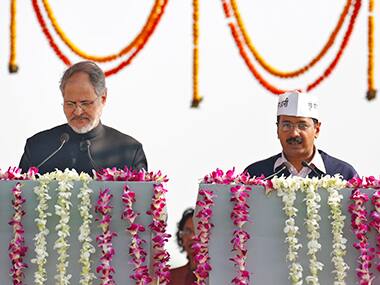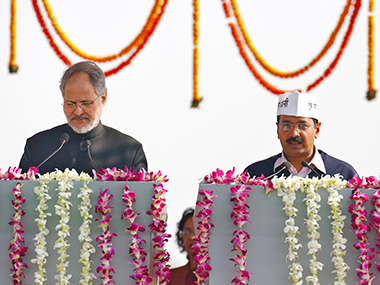By Sreenivasa Reddy Kethiry In today’s world, if building a consensus is often seen as a tedious and attritional process, then the end logical product, i.e. compromise is downright perceived to be a dirty word. In an age of partisanship and single point agendas compromise and consensus are seen in conjunction with a third “c” word – capitulation. Anything that deviates from the well-heeled, ideological puritansim of their stated positions is seen as abject surrender and a humiliating sell-out. The case of the Aam Aadmi Party (AAP) resigning from governing Delhi and the Telangana issue that is rocking Parliament today are fine examples of what currently plagues our system – the perception that compromise and consensus are evil terms. This coupled with a perception that those in constitutional posts such as Governors and Speakers of Parliament and Assemblies being partisan and arbitrary have left us with an overall sense of disillusionment in our parliamentary democracy. [caption id=“attachment_1396787” align=“alignleft” width=“380”]
 Delhi’s Lt. Governor Najeen Jung (left) has been strongly criticised by Arvind Kejriwal and AAP. Reuters[/caption] The AAP’s attempt to paint itself as the sole clean chit printing press smacks of brinkmanship and one-upmanship rather than a sincere attempt to alter the discourse of politics. Mahatma Gandhi’s views on compromise are well known. The Mahatma is known to have once said, ”all compromise is based on give and take, but there can be no give and take on fundamentals. Any compromise on mere fundamentals is a surrender. For it is all give and no take.” If the AAP’s fundamental position was to have a strong Lokpal bill to weed out corruption, then it is this fundamental position that it must have sought not to compromise on. The process of achieving this in a manner amenable to all stakeholders would by no means have been a surrender of its goal to weed out corruption. Thus to resign in this pretext was the actual capitulation of the AAP. The Telangana issue that has led to a blockade of Parliament over the last two sessions is another example where an attempt at genuine consensus building was not even attempted. The Centre was looking for short-term electoral gains and thought it could push through an unpalatable decision without being questioned. Rather than trying to make a genuine attempt at making all stakeholders sit around a table to discuss the issue at hand, the centre decided behave like an ostrich in the sand – refusing to acknowledge that an issue existed and thinking that the protests would die down by waging a war of attrition. The spectacular failure of this strategy and an absence of a Plan B led to a near washout in the last two sessions of parliament. Both in the case of the AAP and in the case of Telangana there seems to be a grouse, valid or imaginary, against the constitutional positions that are stakeholders in the process. As custodians of the constitution these heads have added to the despair of the aggrieved parties. If the Lieutenant Governor was the target of the AAP, then it was the President and the Speaker of the Lok Sabha that aggrieved the MPs of the region of Andhra and Rayalaseema. While the LG was perceived to be propagating an unconstitutional process, the Speaker and President in the case of Telangana issue were perceived to be doing nothing to stop an ostensibly unconstitutional process. As custodians of the constitution it becomes incumbent for such positions to be perceived to be nonpolitical, neutral and non-partisan. The following 6-point charter could go a long way in achieving this: 1) Constitutional Heads must renounce all political ties and affiliations in order to fulfil his or her duty as an impartial arbiter 2) There is already an implicit contract bestowed by the constitution as there is an expectation that the considerable powers proffered will not be abused, and that no favouritism will be shown to a particular side 3) A cooling-off period of two years for President, Vice-President and Governors who are transitioning from any Government position or from a Legislative Position into Constitutional positions 4) A collegium style mechanism as a framework for choosing constitutional heads wherever such a mechanism does not exist 5) Improve transparency and accountability of the decisions taken by these constitutional heads so as to increase public faith in these institutions 6) Relying on precedent or a framework code of conduct to remove discretionary powers in major decisions. Constitutional heads must strive for general consensus of the houses they govern or seek sound legal advice when discretionary powers need to be employed Sreenivasa Reddy Kethiry is Secretary, Visalandhra and a member of #RescueIndia, www.rescueindia.in, a campaign that aims at ensuring that constitutional positions such as those of the President, Vice President, Governors and Speakers are non-partisan, neutral and non-political.
Delhi’s Lt. Governor Najeen Jung (left) has been strongly criticised by Arvind Kejriwal and AAP. Reuters[/caption] The AAP’s attempt to paint itself as the sole clean chit printing press smacks of brinkmanship and one-upmanship rather than a sincere attempt to alter the discourse of politics. Mahatma Gandhi’s views on compromise are well known. The Mahatma is known to have once said, ”all compromise is based on give and take, but there can be no give and take on fundamentals. Any compromise on mere fundamentals is a surrender. For it is all give and no take.” If the AAP’s fundamental position was to have a strong Lokpal bill to weed out corruption, then it is this fundamental position that it must have sought not to compromise on. The process of achieving this in a manner amenable to all stakeholders would by no means have been a surrender of its goal to weed out corruption. Thus to resign in this pretext was the actual capitulation of the AAP. The Telangana issue that has led to a blockade of Parliament over the last two sessions is another example where an attempt at genuine consensus building was not even attempted. The Centre was looking for short-term electoral gains and thought it could push through an unpalatable decision without being questioned. Rather than trying to make a genuine attempt at making all stakeholders sit around a table to discuss the issue at hand, the centre decided behave like an ostrich in the sand – refusing to acknowledge that an issue existed and thinking that the protests would die down by waging a war of attrition. The spectacular failure of this strategy and an absence of a Plan B led to a near washout in the last two sessions of parliament. Both in the case of the AAP and in the case of Telangana there seems to be a grouse, valid or imaginary, against the constitutional positions that are stakeholders in the process. As custodians of the constitution these heads have added to the despair of the aggrieved parties. If the Lieutenant Governor was the target of the AAP, then it was the President and the Speaker of the Lok Sabha that aggrieved the MPs of the region of Andhra and Rayalaseema. While the LG was perceived to be propagating an unconstitutional process, the Speaker and President in the case of Telangana issue were perceived to be doing nothing to stop an ostensibly unconstitutional process. As custodians of the constitution it becomes incumbent for such positions to be perceived to be nonpolitical, neutral and non-partisan. The following 6-point charter could go a long way in achieving this: 1) Constitutional Heads must renounce all political ties and affiliations in order to fulfil his or her duty as an impartial arbiter 2) There is already an implicit contract bestowed by the constitution as there is an expectation that the considerable powers proffered will not be abused, and that no favouritism will be shown to a particular side 3) A cooling-off period of two years for President, Vice-President and Governors who are transitioning from any Government position or from a Legislative Position into Constitutional positions 4) A collegium style mechanism as a framework for choosing constitutional heads wherever such a mechanism does not exist 5) Improve transparency and accountability of the decisions taken by these constitutional heads so as to increase public faith in these institutions 6) Relying on precedent or a framework code of conduct to remove discretionary powers in major decisions. Constitutional heads must strive for general consensus of the houses they govern or seek sound legal advice when discretionary powers need to be employed Sreenivasa Reddy Kethiry is Secretary, Visalandhra and a member of #RescueIndia, www.rescueindia.in, a campaign that aims at ensuring that constitutional positions such as those of the President, Vice President, Governors and Speakers are non-partisan, neutral and non-political.
India's president, governors need to be above politics
FP Archives
• February 18, 2014, 17:50:25 IST
As custodians of the constitution it becomes incumbent for the positions of President, Vice President, Governors and Speakers to be perceived to be nonpolitical, neutral and non-partisan.
Advertisement
)